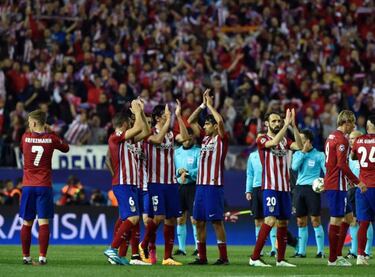The Simeone effect goes global
Simeone has challenged Real Madrid and Barcelona, and taken Atleti to the heights in Europe. The 1-0 win over Bayern in the Champions League semi-final first leg is his latest success.
The ‘Simeone phenomenon’ has become a worldwide movement. The emergence of Atleti as a legitimate challenger to the Barcelona-Real Madrid duopoly has gone from being a feel-good story to an established reality in world football. The international press wax lyrical about the virtues that have allowed cholismo (from 'Cholo', the coach's nickname) to challenge la Liga’s all-powerful big two, Real Madrid and Barcelona, and to establish the club as a European heavyweight in its own right.

Related stories
‘El Cholo’ Simeone has imposed his way of playing and the football world has embraced his style: intensity, hard work, teamwork and, above all, defence. In the Premier League he is seen as the ideal candidate to revive the fortunes of a big club. In Italy he represents a revolutionary counter to the tiki-taka culture that has dominated football since the turn of the century, the inventor of a kind of Catenaccio 2.0 capable of returning legitimacy to that kind of play.
But Simeone also has his critics, many of them wary that his success will herald a return to the ultra-defensive tactics of old. More is at stake on Tuesday night in Munich than just a place in the Champions League final. Two very different styles of play, and two ways of looking at the game of football, face off against each other. If Atleti come out on top and reach the final it will be a massive blow to Guardiola's way of seeing the world, guardiolismo, and a Bayern side knocked out by Spanish sides three years in a row at the semi-final stage; and definitive positioning of cholismo as a viable and effective alternative to teams loaded with star-studded forward lines.

